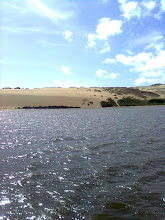
Gaia (pronounced /ˈgeɪə/ or /ˈgaɪə/) ("land" or "earth", from the ancient Greek Γαîα; also Gæa or Gea (Modern Greek Γῆ) is the primal Greek goddess personifying the Earth.
Gaia is a primordial and chthonic deity in the Ancient Greek pantheon and considered a Mother Goddess or Great Goddess.
Her equivalent in the Roman pantheon was Terra.
Gaia is a primordial and chthonic deity in the Ancient Greek pantheon and considered a Mother Goddess or Great Goddess.
Her equivalent in the Roman pantheon was Terra.
She brought forth Uranus, the starry sky, her equal, to cover her, the hills, and the fruitless deep of the Sea, Pontus, "without sweet union of love," out of her own self through parthenogenesis. But afterwards, as Hesiod tells it, she lay with her son, Uranus, and bore the World-Ocean Oceanus, Coeus and Crius and the Titans Hyperion and Iapetus, Theia and Rhea, Themis, Mnemosyne, and Phoebe of the golden crown, and lovely Tethys. "After them was born Cronus the wily, youngest and most terrible of her children, and he hated his lusty sire."
From the testicles of Uranus in the sea came forth Aphrodite. For this, a Greek etymologist urged, Uranus called his sons "Titans," meaning "strainers" for they strained and did presumptuously a fearful deed, for which vengeance would come afterwards; for, as Uranus had been deposed by his son, Cronos, so was Cronos destined to be overthrown by Zeus, the son born to him by his sister-wife Rhea. In the meantime, the Titans released the Cyclopes from Tartarus, and Cronos was awarded the kingship among them, beginning a Golden Age.
Gaia is believed by some sources (Joseph Fontenrose 1959 and others) to be the original deity behind the Oracle at Delphi. She passed her powers on to, depending on the source, Poseidon, Apollo or Themis. Apollo is the best-known as the oracle power behind Delphi, long established by the time of Homer, having killed Gaia's child Python there and usurped the chthonic power. Hera punished Apollo for this by sending him to King Admetus as a shepherd for nine years.
Oaths sworn in the name of Gaia, in ancient Greece, were considered the most binding of all.
In classical art Gaia was represented in one of two ways. In Athenian vase painting she was shown as a matronly woman only half risen from the earth, often in the act of handing the baby Erichthonius (a future king of Athens) to Athena to foster (see example above).
In Lithuanian mythology Gaia - Žemė is daughter of Sun and Moon. Also she is wife of Dangus (Varuna).
In Indian religions, the Mother of all creation is called "Gayatri", a surprisingly close form of Gaia.
From the testicles of Uranus in the sea came forth Aphrodite. For this, a Greek etymologist urged, Uranus called his sons "Titans," meaning "strainers" for they strained and did presumptuously a fearful deed, for which vengeance would come afterwards; for, as Uranus had been deposed by his son, Cronos, so was Cronos destined to be overthrown by Zeus, the son born to him by his sister-wife Rhea. In the meantime, the Titans released the Cyclopes from Tartarus, and Cronos was awarded the kingship among them, beginning a Golden Age.
Gaia is believed by some sources (Joseph Fontenrose 1959 and others) to be the original deity behind the Oracle at Delphi. She passed her powers on to, depending on the source, Poseidon, Apollo or Themis. Apollo is the best-known as the oracle power behind Delphi, long established by the time of Homer, having killed Gaia's child Python there and usurped the chthonic power. Hera punished Apollo for this by sending him to King Admetus as a shepherd for nine years.
Oaths sworn in the name of Gaia, in ancient Greece, were considered the most binding of all.
In classical art Gaia was represented in one of two ways. In Athenian vase painting she was shown as a matronly woman only half risen from the earth, often in the act of handing the baby Erichthonius (a future king of Athens) to Athena to foster (see example above).
In Lithuanian mythology Gaia - Žemė is daughter of Sun and Moon. Also she is wife of Dangus (Varuna).
In Indian religions, the Mother of all creation is called "Gayatri", a surprisingly close form of Gaia.
Susapnuoti Gają. Tokiu kontekstu... Neįtikėtina. Kažkas tame danguje vis dėlto vyksta. Ir tas Kantas buvo beprotiškai teisus, kalbėdamas apie žvaigždėtą dangų. Chemija. Daugiau nieko. Haris Poteris :)))


Komentarų nėra:
Rašyti komentarą